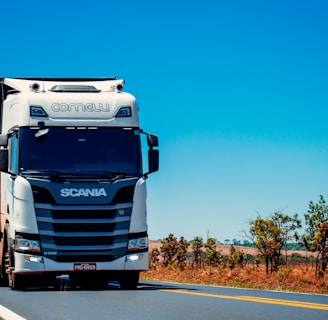Project Beta
The trucking industry is the backbone of global trade, responsible for transporting goods across vast distances efficiently. However, it faces challenges such as driver shortages, rising fuel costs, inefficiencies in route planning, and safety concerns. Artificial Intelligence (AI) is now revolutionizing trucking by optimizing operations, improving safety, and reducing costs.
BUSINESSTECH
Allen Morgan
2/4/20251 min read


The integration of AI in trucking is transforming operations by improving efficiency and reducing risks. AI-powered solutions enable companies to automate decision-making, optimize logistics, and enhance overall performance.
1.1 AI-Driven Route Optimization
One of the most significant applications of AI in trucking is route optimization. AI-powered GPS systems analyze real-time data, including:
Traffic conditions
Weather patterns
Road closures
Fuel stations availability
These AI-driven insights help truck drivers select the most efficient routes, reducing fuel consumption, lowering costs, and improving delivery times. AI-based route planning also minimizes idle time and enhances overall logistics efficiency.
1.2 Predictive Maintenance for Fleet Management
AI-powered predictive maintenance technology analyzes truck performance data and identifies potential mechanical failures before they occur. By monitoring engine diagnostics, tire pressure, and fuel efficiency, AI helps prevent unexpected breakdowns.
The benefits of predictive maintenance include:
Reduced downtime: Trucks spend less time in repair shops and more time on the road.
Lower maintenance costs: Preventive repairs are significantly cheaper than emergency fixes.
Extended vehicle lifespan: AI helps maintain trucks in optimal condition, maximizing their longevity.
1.3 AI-Powered Freight Matching and Load Optimization
AI is transforming freight management by matching available loads with nearby trucks efficiently. Smart logistics platforms use AI-driven algorithms to:
Identify the best carrier for each shipment
Optimize truckloads to prevent empty miles
Reduce fuel consumption and increase profitability
AI-based freight matching platforms help logistics companies minimize wasted capacity and improve delivery efficiency.
1.4 Autonomous and Semi-Autonomous Trucks
Autonomous truck technology is one of the most exciting AI-driven innovations in the trucking industry. Companies like Tesla, Waymo, and TuSimple are developing AI-powered self-driving trucks to enhance safety and reduce labor costs.
While fully autonomous trucking is still in its early stages, AI is already improving driver-assist systems, enabling:
Lane-keeping assistance
Collision avoidance
Adaptive cruise control
Automatic braking systems
These features improve safety and reduce the risk of accidents caused by human error.
